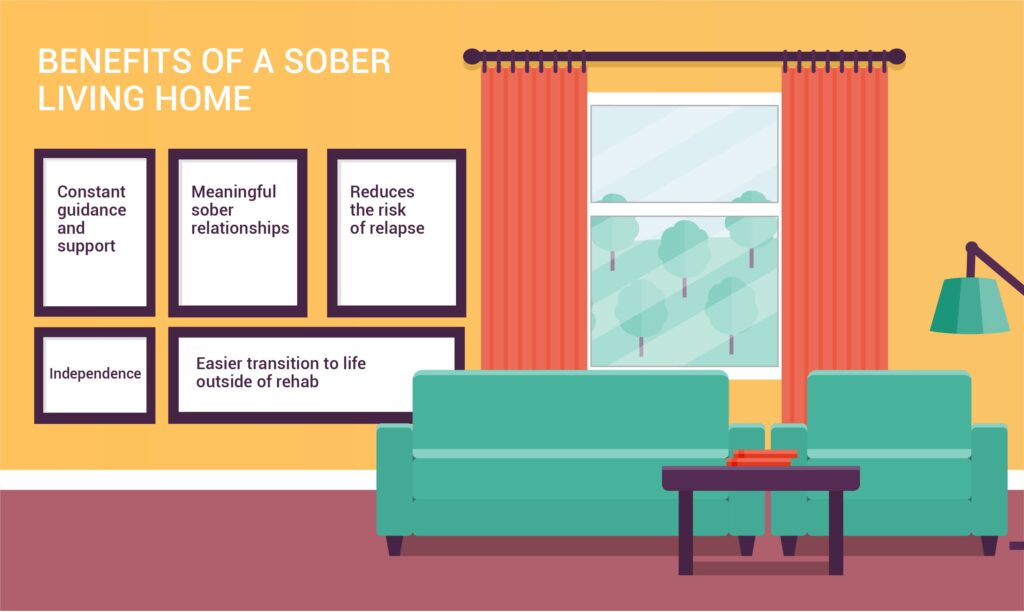A sober living home is a residence where people to stay while they are recovering from addiction. Usually, someone staying in a sober living home contributes to the community by doing chores and following all of the house rules. They do enjoy certain freedoms and can come and go to work or school and return as they please.
This type of environment can help assist the recovery process and promote long-term sobriety as you adjust to a healthy, drug-free life.
Find the location that works for you.

What Is the Difference Between Sober Living Homes and Drug and Alcohol Rehab Centers?

If you thought sober living homes and rehab centers are the same, you’re not alone. Many people do not realize that sober living homes and drug and alcohol rehab centers (a more formal addiction treatment program) are two completely different places with different goals to help the patient recover.
Keep in mind that the sober living cost and rehab center cost will also vary.
Sober Living Homes Vs. Drug and Alcohol Rehab Centers
The primary goal of a rehab center is to help the patient recover from substance use in a sober environment. In contrast, a sober home (also called halfway houses) helps assist the patient to maintain a sober and drug-free lifestyle usually after completing a rehab or detox program.
A sober living home is a residence you can live in with other sober housemates. Anyone seeking to recover from their substance use can join a sober living community usually once they are released from a rehab, detox, or outpatient treatment center.
Sober living houses can help you ease the transition of reentering the outside world.
Maybe you’re wondering if a sober living home is right for you. Wondering if there’s sober living near me? There’s no shame in finding additional help at halfway houses.
Our environment can affect us greatly, and drug free living environments can keep you on track. Joining a sober living home is completely voluntary. This environment can help those struggling with addiction lead a healthy, normal life. It also can help promote long-term addiction recovery.
We want you to make an informed decision about whether a sober living home is the right fit.

Pros of a Sober Living Home
1. Constant Guidance and Support
The people you’re living with have traveled down a similar path. In recovery housing, people surround you who will support your recovery and hold you accountable.
Hopefully, you’ll create meaningful relationships at halfway houses with people who are committed to a sober lifestyle.
2. Meaningful Sober Relationships
During the path to recovery, most people cut ties with those they formed a codependent and toxic relationship with. It’s okay to realize those relationships don’t serve you anymore.
As you work to change your life, you’ll end up forming deeper and more meaningful bonds with those that share your lifestyle. Living in a sober living home helps you meet a network of people who share your new lifestyle.
3. Independence
Sober living houses is to help create your independence while staying on track in substance abuse recovery.
People who live in sober homes and transitional housing must learn to be good roommates and follow the house rules. These may include cooking and cleaning, respecting the curfew and, of course, staying sober.
4. Easier Transition to Life Outside of Rehab
Re-entering the world after a stay in a rehab center can be challenging and a little scary. Living in a sober home with controlled but open sober living environments can help ease that transition.
Sober living homes have a house manager that is there to support you and help prevent the possibility of a relapse.
5. Reduces the Risk of Relapse
With a house manager there to guide you and residents there to support you, you’ll have a network that reduces your risk of a relapse. We know that everyday stressors and feelings of guilt are huge contributors to the possibility of a relapse.
Living in a quality sober living home with people who understand your struggles and how to overcome them is highly beneficial in early recovery.
Cons of a Sober Living Home
It isn’t for everyone. If you or your loved one require a higher level of care with increased monitoring and detox, a sober living home may not be the best place to start for treating drug or alcohol addiction.
Sober Living Homes Near Me

You may wonder if there are any sober living homes near you. Sober living homes have helped many people maintain a sober lifestyle.
If you or your loved one needs more help, we will work with you to find the best treatment plan.
What To Expect in a Sober Living Home
Many sober living homes do not provide treatments or conduct sessions for addicts, which is what takes place in rehab. Instead of addiction recovery treatment programs, residents will learn to manage the routines of everyday life.
By adhering to the house rules, sober living residents will have the responsibility to cook and clean, take part in activities with other residents, respect the curfew, and may even develop new social skills and friendships. Also, they will be supervised by a house manager and be required to maintain a code of conduct.
House Rules
House rules may vary, but the most important rule of the house is to maintain sobriety. Residents are not allowed to use any type of drugs or alcohol.
The purpose of the rules is to help residents learn how to be responsible for themselves and their behavior. If you violate the rules, there are consequences. Depending on the severity, sober living homes may shorten your curfew, ask you to sign a behavioral contract, or ask you to leave.
House rules can be a comfort to those in a sober living home. People who struggle with a substance use disorder may struggle with maintaining healthy boundaries and transitional living arrangements help.
Having clear and defined consequences can help you understand setting boundaries and learn how to function within a group. It can also improve your coping mechanisms.
To help you better understand what to expect from a sober living home, here are the rules our house follows:
1. Respect the Curfew
Residents report to the sober living house at a certain time. This is especially important for new patients who are adjusting to the new environment. You may need to attend weekly house meetings.
You may be granted more flexibility under certain guidelines as you progress and stay sober.
2. Clean and Maintain All Living Spaces
We want you to take pride in your living space. Maintaining and cleaning your room and the communal areas shows respect for your roommates and yourself.
Residents create the sober living house cleaning schedule and rotate chores.
3. Prep and Cook Meals for Our Communal Dining
Every member has a duty to grocery shop and cooks when communal meals are served. These peer-supported duties are also assigned on a rotational basis.
4. Work on Your Personal Treatment Plan Goals
Everyone is different, every person’s recovery journey is different, so we will specifically create your treatment plan goals to help you.
5. Pay Your Rent, On Time
Sober living homes typically charge a weekly or monthly rental fee. You’ll want to ask for pricing upfront to ensure the cost is within your budget. Costs of sober living can range anywhere from $50 a week to $300 a week.
If you think a sober living home might be right for you, call us to set up an appointment. At Zinnia Health, we are deeply committed to providing comprehensive, customized addiction recovery treatment plans for every one of our patients. Call us at any hour, day or night, at (855) 430-9439.
Who Can Stay in a Sober Living Home?

For some sober living programs, there are no restrictions on who may apply to live there. Most residents of these facilities have already completed a rehabilitation program for substance use.
People who are farther along in their journey of recovery are more likely to succeed in a sober living home because they are already equipped with tools to maintain sobriety. However, while it is common to spend time in a rehab center, it is not always a requirement for entry.
In addition, it is beneficial for the resident to complete a detox program to ensure they are medically stable and will not experience many more withdrawal symptoms that will make it harder to stay sober.
How Would I Benefit from Recovering in a Sober Living Home?

According to a study by the Alcohol Research Group Public Health Institute, their research found positive outcomes for the 300 individuals they tracked in sober living homes and concluded that a sober living residence is an effective option for those in need of alcohol and drug-free housing.
From their data, they found significant improvements in levels of alcohol and drug use, arrests, psychiatric symptoms, and employment.
The rules, expectations, and community in a sober house gives recovering addicts the support and structure that they need to ease their transition back to their normal daily lives.
A sober living home is a great way to learn how to manage substance abuse addiction in the real world and increase the chances that a recovering addict will remain sober.
Sober living homes also provide a space to treat co-occurring disorders. We know there is a link between mental illness and a battle with addiction and alcoholism. Having a community can help improve or reduce symptoms associated with co-occurring disorders, such as anxiety, depression, PTSD, etc.
At Zinnia Health, we create a plan to treat the complete individual. If you are struggling with a substance abuse disorder and a co-occurring disorder, we will create a treatment plan that addresses the root causes.
We don’t believe in putting band-aids on larger wounds. Our staff will take the time to get to know you, your triggers, and help you work to live a healthy, drug and alcohol-free life.
The advantages of staying in a sober living facility are abundant. While we have mentioned many benefits of sober living homes, we haven’t touched on every positive.
Here’s a list of other benefits we haven’t mentioned or want to recap:
- Sober houses provide a positive space for recovery as they are alcohol and drug-free environments.
- Sober living homes provide a social environment, which allows positive relationships to thrive that might become long-lasting sober friendships.
- Sober housing aids recovery by providing an environment that allows its residents to become independent and self-supporting. The environment also promotes empowerment and emotional health.
- Sober living homes are usually single-family homes in quiet, residential neighborhoods.
- Sober living homes have established rules that keep the residents safe and sober. The rules also set clear expectations and boundaries.
- Sober living homes are affordable.
- Sober housing has activities such as meditation, yoga, and 12-step meetings to strengthen the sobriety of its residents.
- Sober housing can be a wonderful option for someone who wants to ease the transition of returning to the outside world without the risks of returning to familiar places and people associated with their substance abuse history.
Contact Us to Find a Safe Haven for Sobriety

At Zinnia Health, we are deeply committed to providing comprehensive, customized addiction recovery treatment plans for every one of our patients.
If you believe joining a sober living home is the right step for you, please contact us to learn about what we offer.
Reasons to call us:
- Free clinical assessment
- No obligation to enter treatment
- Talk with a dedicated Admissions Coordinator
Zinnia Health gives our patients evidence-based and holistic therapies that are held in an intimate, small group private setting.
We are a dual-diagnosis treatment center that specializes in treating alcohol or drug addiction, as well as addressing underlying mental health issues such as anxiety, depression, trauma, attention deficit, and borderline personality disorders.
Call us today at (855) 430-9439 to learn more.

